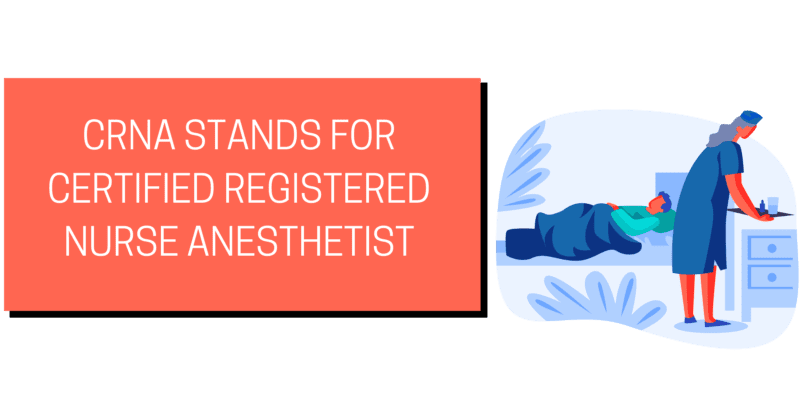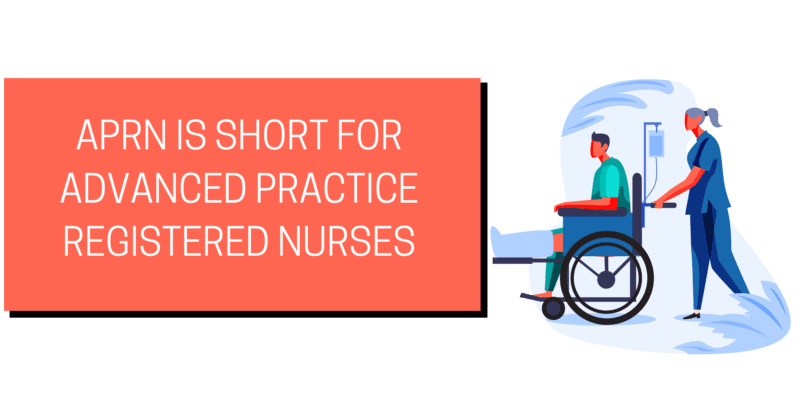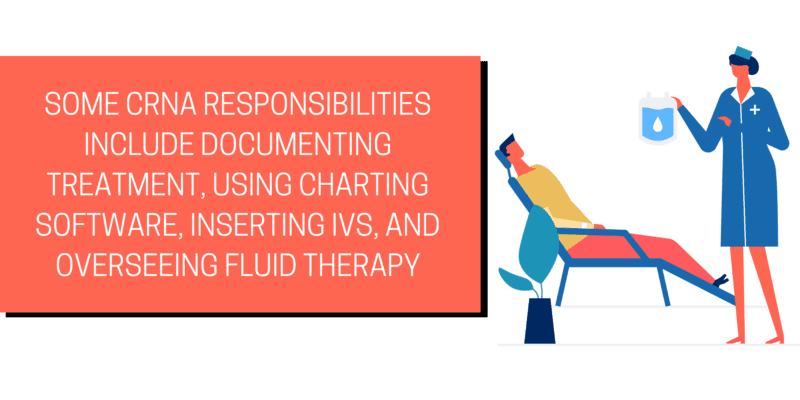Key Takeaways:
- CRNAs administer anesthesia, manage patient pain, and oversee recovery.
- They work in diverse settings with surgeons, anesthesiologists, and other healthcare professionals.
- The role requires advanced training beyond a registered nurse, including a CRNA master’s degree.
- CRNAs report high job satisfaction and are among the highest paid nursing specialties.
If you want to become a nurse, you’ve decided to build a career as a vital, selfless professional. As a nurse, you’ll take care of patients in many ways. These include helping to organize their care interfacing between them, doctors, and other forms of bureaucracy, and much more.
Becoming a nurse is challenging, but also fulfilling. You’ll leave work each day knowing you made a real difference helping people in some of their frailest, most fearful moments. While you may think of nursing as a generalist career path, there are concrete roads within it you can choose from.

Nurses face some stigma that what they do is somehow less important than the work of doctors. Not only is this completely false, but the training for some nursing positions is just as rigorous, challenging, and grueling as the education and experience doctors need to be successful. As you’ll see, nurses — especially those who reach elite nursing specializations and certifications — are required to go through years of school, training, and earn specific, distinct certifications. Just figuring out the path you’ll take through school and work to reach a highly demanded and top paying role in the field is a challenge in itself.
One highly coveted role in nursing is working as a CRNA. CRNA’s are Certified Registered Nurse Anesthetists. They administer anesthesia, stabilize patients, deal with pain management, and supervise patient recovery in many ways. They work with surgeons, anesthesiologists, podiatrists, dentists, and other health professionals.

CRNAs are only able to attain this credential after completing a Certified Registered Nurse Anesthetist Degree program. CRNAs report extremely high work satisfaction and earn the most of any nursing specialty. If this describes you, let’s get into the nitty-gritty of actually achieving one of these roles, and what you’ll be doing:
Skip To
- What are Certified Registered Nurse Anesthetists and How Do You Become One?
- What is a Bachelor of Science in Nursing? What are some of the aspects of a BSN Curriculum?
- What Do You Do in Acute Care? What Is Expected of a CRNA?
- What is a Critical Care Registered Nurse? What is a CCRN Certification?
- What is a CRNA Degree? What is the Coursework in a CRNA Program?
- Ask Yourself and Examine the Following About Your Nursing Education and Career
- What Makes CRNAs Highly Desired?
- How Can We Help You Find a Nursing Degree and Better Understand the World of Nursing?
- What Can I Expect to Earn as a CRNA? How Demanded are CRNAs, and What Are Their Employment Statistics?
What are Certified Registered Nurse Anesthetists and How Do You Become One?
CRNAs are advanced practice registered nurses (APRN). That means they have significantly more training and responsibilities than standard registered nurses.
CRNAs give anesthesia to patients as they approach trauma, obstetrical, and surgical procedures. Anesthesia includes inhalants, injections, and oral anesthetics. Their work doesn’t end there, as CRNAs monitor patients throughout their systems and while they recover. They also work with doctors and other health practitioners to create pain management programs to streamline patient recovery.

So how does one become a CRNA? First, you’ll need to become a registered nurse (RN) with either an Associate Degree in Nursing (ADN) or a Bachelor of Science in Nursing (BSN). For the vast majority of programs, you can expect you’ll need a BSN. You’ll then need at least a year of experience in an ICU, ER, or other acute care environments. It could take longer depending on the school you’ll attend to earn a CRNA master’s degree, but a year is a good benchmark. After graduating from a CRNA degree program, you’ll be eligible to take the certifying exam from the National Board of Certification and Recertification for Nurse Anesthetists (NBCRNA).
In total, from (most likely) earning your Bachelor’s through getting your CRNA certification and state licensing, you’ll need to train, study, and work for 7-9 years.
Keep in mind that the experience required to become a CRNA can vary based on the state you’re working in, the organization you want to work as a CRNA for, and other factors. This guide goes over some of the central, pressing requirements and opportunities in the field. Depending on where you are in the process of working as a CRNA, you’ll want to do specific research on health organizations you want to work for, state requirements, and more. Going to a job fair can be a great way to understand specifics that apply to your situation, education, career, and goals.
Some of the other requirements of highly competitive CRNA programs include:
- Often at least three professional references could be required for entry to a CRNA degree program.
- Completing a course in inferential statistics.
- An undergraduate GPA of 3.0, and maintaining high grades in science courses.
- Completion of the GRE, and a specific grade on it within five years of your CRNA application.
- Certifications in areas like basic life support, pediatric advanced life support, advanced cardiac life support, among others.
- Management of mechanical ventilations.
-
But because all roads to becoming a CRNA begin with a Bachelor’s degree, let’s explore what a Bachelor of Science in Nursing looks like:

What is a Bachelor of Science in Nursing? What are some of the aspects of a BSN Curriculum?
In a Bachelor of Science in Medicine Major in Nursing — sometimes known as a BSN, BScN, Bachelor of Nursing (BN), Bachelor of Science (BS) with a Major in Nursing — you’ll spend three to four years preparing to practice nursing, and/or continue your education. Degrees differ in their titles based on their curriculum. For example, BScN and BSN degrees will likely have more math and science coursework like physics, chemistry, and calculus. On the other hand, a BN degree will concentrate more on nursing practice, theory, processes — anything that prepares graduates for the practical, day-to-day life of a working nurse.
Depending on the degree program you choose, you can go down a lane towards nursing research, working in nursing education, becoming a leader in the field, or working in private practices, public hospitals, and other healthcare environments.
What Do You Do in Acute Care? What Is Expected of a CRNA?
To be a CRNA, you’ll need acute care experience. So what does that mean? Acute care experience generally refers to working in a hospital. You’ll need to show you can deal with a sophisticated, hectic health environment. Being a nurse involves intense juggling and aptly wearing many different hats. A taste of the skills you can expect to build and practice while working in acute care, and as a CRNA include the following:
- Communication: Nurses interface with doctors, patients, families, health institutions, and much more. You’ll need superb verbal and written communication skills.
- Memory and Organization: As a nurse, you’ll need to remember a mountain of specifics about different medical problems, up-to-date information about patients, and much more. Your ability to build, retain, and organize information under great stress will be tested and forged during acute care experience.
- Problem-Solving Skills: CRNAs, and nurses, in general, need to tackle intricate issues pertinent to individual patients. How do you maintain a patient’s vitals while putting them under? What happens if you discover an allergy to a particular anesthetic that wasn’t previously documented? Reacting to evolving circumstances is a big part of this job.
- Documentation and Use of Software: Your success relies on your ability to record details about patients, and to review existing documentation. Today, documentation involves using the latest software that charts patient history and up-to-date information about their progress and reactions to your treatments.
- Sedation: Some medical processes call for conscious sedation, and others unconscious. Knowing when to implement either, or changing your approach is of paramount importance to great outcomes for those in your care, and yourself.
- IV insertion and Fluid Therapy: CRNAs are masters of getting the right chemicals into the human body in many ways. Delivering these chemicals often includes using tubes and fluids to deposit treatment directly into the bloodstream, and other bodily systems.
These are just some of the skills and practices you’ll need to practice in acute care, and throughout your work as a CRNA.
Let’s look at a credential that can help you distinguish yourself from other CRNA candidates:

What is a Critical Care Registered Nurse? What is a CCRN Certification?
Let’s say you’ve earned your BSN and completed your acute care experience. If you want to compete and thrive in a master’s program in nursing anesthesia, you might consider a certification that could improve your chances. Some people in this position opt for a CCRN certification.
There are many subsets of this certification, but all include working with critically ill patients. With this certification added to your CV, you’re more likely to get accepted into a CRNA program, especially one of the more competitive ones.
What is a CRNA Degree? What is the Coursework in a CRNA Program?
CRNA degree programs are intensive, upper-level graduate degrees that push nurses to new heights. You’ll learn specific skills and train in a way that’s similarly difficult to becoming an MD.
The American Association of Nurse Anesthetists notes that most student nurse anesthetists complete 2,500 clinical hours and administer 850 anesthetics in addition to their coursework. To maintain this position you’ll need to be recertified every two years.
Courses you’ll take in these programs include:
- Pain Management
- Professional and Legal Requirements of Nurse Anesthesia Practice
- Physics, Chemistry, and Biochemistry
- Pathophysiology, Anatomy, and Physiology
- Research and Statistics
- Anesthetic Pharmacology
- And much more
Ask Yourself and Examine the Following About Your Nursing Education and Career

- What do you want to do in your career? Is becoming a CRNA your ultimate goal? Are you sure you’d prefer this path over other roles in nursing?
- Where are you in your nursing career and education? Are you a registered nurse? Have you earned your Bachelor’s?
- If the answer to either is no, you’re going to want to do both first. If you know you want to be a CRNA, great! Try to tailor your nursing education and placement towards anesthesia as much as possible to get a leg up on your competition.
- Make sure the Council on Accreditation of Nurse Anesthesia Educational Programs (COACRNA) has approved any CRNA degree program you’re considering .
- If you’ve done the prerequisite work to begin a CRNA degree program, awesome! Now ask yourself, where would you like to study for your master’s? CRNAs are in high demand across the medical job market, but it might be useful to study somewhere near where you’d like to work eventually.
- Your career goals aren’t necessarily confined to a specific city or state you might want to work in. You might want to work in a particular health setting or specialize with a population, surgical subfield, or condition.
- Ask yourself, how will a CRNA degree program you’re considering get you ready for these goals?
- If you don’t know exactly what you’d like to do as a CRNA, but are determined to become one, that’s OK too. As you learn and train more, you’ll get to find a place in the field as you go along.
- Where do you want to work as a CRNA? There are states that have higher pay, and areas with a higher demand for CRNAs.
- How much time can you commit to a CRNA degree daily, weekly, and in total before you graduate? You can expect a CRNA program to allow you to work while you study, but that might not be best for you. Building a schedule that allows you to meet your current responsibilities and doesn’t lead to burn out goes a long way towards reaching your goals in the field.
- Do you want to study online? Becoming a CRNA will always require in-person work, but you can do a significant amount of your coursework online. Online coursework can save you time, money, and travel as you get your degree.
- Do you want to study part-time? You’ll need at least 36 months of coursework to become a CRNA, but studying part-time can make this process longer.
These nursing degree and career prompts are just a few of the questions to ask yourself. Writing out answers to these questions, and adding others that pertain to your individual situation will help you organize and prioritize your school applications. They’ll also help you decide whether this is the right path for you.
Now let’s inspect areas of experience that can add to your job and education prospects:
What Makes CRNAs Highly Desired?
CRNAs have experience in many areas beyond simple anesthesia. You can increase the jobs you’ll qualify for by developing proficiencies in:
- Surgery: CRNAs are constant facilitators and participants in surgical procedures, so working in surgery before, after, and during your CRNA training can give you a headstart on your competition.
- Advanced Cardiac Life Support (ACLS): In training and education about ACLS you’ll learn to treat patients who are experiencing strokes, cardiac arrest, and other medical crises involving the cardiovascular system.
- Patient care: All nurses work in patient care. The more experience you have here, the better you can separate yourself from other CRNA candidates.
- Pain management: Anesthesia is a form of minimizing pain to facilitate procedures designed to help patients, no matter how invasive. Working in pain management is a great way to prepare yourself for CRNA education and training.
- Airway management: Anesthesia can interfere with breathing, so it’s invaluable to understand airway control and help patients maintain their breathing in a variety of health procedures and problems.
- Cardiopulmonary Resuscitation (CPR): All nurses need CPR experience, but the issues a CRNA deals with that impact cardiopulmonary functions are far more acute.
- Postoperative care: CRNA work doesn’t end when an operation does. Working with patients before, during, and after an operation is essential to CRNA efficiency and best outcomes for patients and CRNAs alike.
- Teaching ability: Because CRNAs are rare, highly desired nursing positions, it’s common for them to work in the education of future nurses and aspiring CRNAs.
- Critical care: CRNAs often work with the most unstable and seriously ill patients who have sustained life-threatening injuries, surgeries, or diseases.

Now that we’ve covered separating yourself from other CRNA candidates, let’s explore what we can do for you in your search for a nursing degree and career:
How Can We Help You Find a Nursing Degree and Better Understand the World of Nursing?
Here at Best Health Degrees, we’re committed to making your life in healthcare easier. We’re continually writing guides and providing resources to do exactly that. Some of the work we’ve done to answer important questions and help you find the right CRNA degree for you includes the following:
Common Questions
- How Do I Become a Nurse Anesthetist?
- How Do You Become a Critical Care Nurse?
- What is a Nurse Anesthesiologist?
- What is a Surgical Nurse?
- What Types of Nursing Degrees Can I Get?
Resources
- What Can I Do with a Bachelor’s in Nursing?
- What Can I Do with a Master’s of Science in Nursing?
- What Can I Do with a Master’s in Health Informatics?
- What Can I Do with a Master’s in Healthcare Administration?
Rankings
- 25 Best Master’s in Healthcare Administration for 2020
- 15 Best Online Master’s in Healthcare Administration for 2020
- 15 Best Online MSN Degree Programs for 2020
- 15 Best Online BSN Degree Programs for 2020
- 25 Best Traditional BSN Degree Programs for 2020
What Can I Expect to Earn as a CRNA? How Demanded are CRNAs, and What Are Their Employment Statistics?

There’s more information about the pay and employment for nurses in general than CRNAs. Here’s an overview of nursing employment courtesy of The United States Bureau of Labor Statistics (all information herein is from BLS unless otherwise noted). BLS defines Nurse Anesthetists as those who “administer anesthesia, monitor patient’s vital signs, and oversee patient recovery from anesthesia.”
- In 2018, nurses earned a median wage of $71,730 annually, or $34.48 per hour.
- In 2018 there were 3,059,800 practicing nurses.
- This was expected to rise by 12% between 2018-28, creating approximately 371,500 new positions in the field.
As for CRNAs, there’s less employment information, but looking through what there is paints an incredibly vibrant picture for people who can complete the credentials needed to begin this incredible career. As of May 2018:
- The median wage for CRNAs was $167,950 annually, or $80.75 per hour.
- The lowest 10 percentile made $56.16 per hour, or $116,820.
- The top 90 percentile and above made at least $100 per hour, or $208,000 or more annually.
The highest levels of CRNA employment were found in the following settings (numbers are approximate, and may have some overlap):
- Offices of Physicians: 23,890 employees. Also had an hourly mean wage of $80.84 and $168,140 annually.
- General Medical and Surgical Hospitals: 13,320 employees. Had an hourly mean wage of $89.90 and $187,000 annually.
- Outpatient Care Centers: 2,050 employees. Had an hourly mean wage of $93.54 and $194,570 annually.
- Offices of Other Health Practitioners: 1,890 employees. Had an hourly mean wage of $79.88 and $166,140 annually.
- Colleges, Universities, and Professional Schools: 1,220 employees. Had an hourly mean wage of $77.33 and $160,850 annually.
The top paying industries for CRNAs are:
- Outpatient Care Centers: Hourly mean wage of $93.54 and $194,570 annually.
- Home Health Care Services: Hourly mean wage of $91.84 and $191,030 annually.
- Local Government, excluding schools and hospitals: Hourly mean wage of $90.30 and $187,830 annually.
- General Medical and Surgical Hospitals: Hourly mean wage of $89.90 and $187,000 annually.
- Employment Services: Hourly mean wage of $88.97 and $185,050 annually.
States with the highest CRNA employment are as follows:
- Texas: 6,140 employees. Hourly mean wage of $76.21 and $158,510 annually.
- North Carolina: 3,050 employees. Hourly mean wage of $85.70 and $178,250 annually.
- Ohio: 2,500 employees. Hourly mean wage of $83.84 and $174,380 annually.
- Michigan: 2,250 employees. Hourly mean wage of $86.81 and $180,560 annually.
- Tennessee: 2,190 employees. Hourly mean wage of $72.54 and $150,880 annually.
States with the highest CRNA pay are:
- Montana: 60 employees. Hourly mean wage of $118.45 and $246,370 annually.
- California: 1,180 employees. Hourly mean wage of $102.03 and $212,210 annually.
- Iowa: 320 employees. Hourly mean wage of $100.54 and $209,130 annually.
- Oregon: 320 employees. Hourly mean wage of $98.91 and $205,730 annually.
- Wisconsin: 680 employees. Hourly mean wage of $98.47 and $204,820 annually.
That’ll do it for our CRNA guide. We hope you’ve found this helpful and informative. Please make sure to check out the rest of our content and come back to Best Health Degrees to see our constantly updating content. Good luck and have a great day.